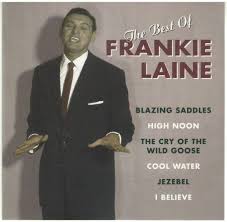Frankie Laine was born on 30 March 1913 as Francesco Paolo Lovecchio in the Italian neighborhood ("Little Italy") of Chicago as the oldest of eight. His father worked as a water seller on the railways in Chicago. He was later railroad worker and a hairdresser. (Also for Al Capone.)
When he was 15, he performed at the Merry Garden Ballroom when he was still at Lane Technical School. After school he worked in a pharmacy. After his school years he participated in marathon dance competitions as Frank Lovecchio.
 In 1932 (the Great Depression), he realised with his partner Ruthie Smith a never surpassed dance record of 3,501 hours in 145 consecutive days on Million Dollar Pier in Atlantic City (New Jersey). In total he participated in 14 dance marathons, of which he became the first three times, second once and fifth twice.
In 1932 (the Great Depression), he realised with his partner Ruthie Smith a never surpassed dance record of 3,501 hours in 145 consecutive days on Million Dollar Pier in Atlantic City (New Jersey). In total he participated in 14 dance marathons, of which he became the first three times, second once and fifth twice.
After 1937, he sang in small clubs. In 1938 he got a job as a singer at WINS radio, which he earned $ 5 a week as Frankie Laine. By World War II, he again stopped singing and went to work in a munitions factory. During his time at defense, he began to write his own songs. He was manager for a trio singers and went with them to Hollywood.
In Los Angeles, he became friends with the composer and pianist Carl Fischer, who wrote songs with him and accompanied him on the piano until he died in 1954.
The end of 1946 he was working in the Billy Mountain Club in Hollywood, where he was discovered by Hoagy Carmichael. He signed a contract with the newly established record company Mercury.
In 1947 he sang "That's My Desire" in Vine Street Club in Hollywood. It was his first gold record and made him an established name in the music world.
He was a first-class jazz singer, and by 1952 he was one of the top record artists. He had his own show in the "Palladium" in London.
In the late forties he began to act in music movies. On television, he had three variety shows: "The Frankie Lane Hour" (1950), "The Frankie Lane Show" (1954 and 1955) and "Frankie Lane Time" (1955 and 1956).
In the sixties, he traveled around the world with a repertoire of his hits.
From 1980 he did more charity work for "Meals on Wheels" and the Salvation Army.
In 1988 he toured England, where his performance was as energetic as ever.
In 1993 his autobiography "That Lucky Old Sun" came out. Shortly after the terrorist attacks on the Twin Towers on September 11, 2001, he took on his last album with songs like "Taps" and "My Buddy". The LP and the proceeds were dedicated to the firefighters of New York.
On February 6, 2007, he died of a heart failure.
Some of his biggest hits include "That's My Desire" (1947), "Mule Train" (1949), "Jezebel " and "Cry of the Wild Goose " (1950), "On The Sunny Side Of The Street" (1951), "I Believe " (1953), "High Noon" and "Moonlight Gambler" (1957).
